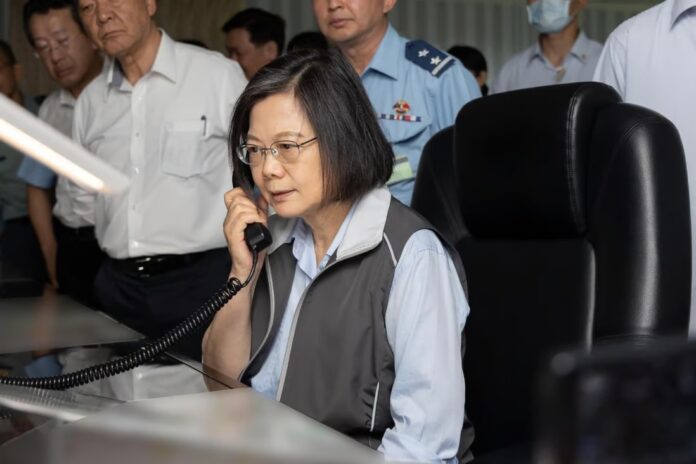The People’s Liberation Army disrupted a radio call between Taiwanese President Tsai Ing-wen and the island’s air force, sparking a discussion about secure communications.
Tsai was visiting southern Taiwan on Friday to boost morale among service personnel ahead of next week’s Dragon Boat Festival and spoke to two female officers stationed at an air defence and missile command centre in Kaohsiung.
In a video clip broadcast by local media, Tsai was seen radioing an air force captain, saying “Hotel Delta, this is the president”, before a PLA warning was heard in the background.
“This is the Chinese air force, you have already intruded into our airspace and seriously violated our sovereignty,” the message said.
Tsai broke into a smile when she heard the warning and an officer came forward to shut down the radio broadcast by the PLA. The conversation continued with Tsai asking the air force captain if she had spotted anything unusual on patrol, and urging her to remain vigilant when she was told nothing had been spotted.
The episode was later remade into a funny clip by the mainland-based nationalistic news outlet Huanqiu.com, showing Tsai making a weird smile.
On Monday, the Taiwanese air force explained that the PLA had not cut into Tsai’s radio channel and the PLA warning came from another radio channel monitored by the control centre of the island’s air force defence and missile command.
“President Tsai was using a combat readiness exclusive radio line for communication and the PLA was using the aircraft emergency frequency in its radio broadcast,” the Taiwanese air force said.
“They were two different systems and the president was not affected at all,” it said, adding that the air force was able to effectively control different situations around Taiwan and respond to all kinds of actions taken by the PLA.
Taiwanese Premier Chen Chien-jen also said on Monday that the PLA had not intercepted Tsai’s radio system.
“This reflects the kind of challenges our air force has to tackle every day in defending our air territory,” he said, referring to the missile command’s role in monitoring what the PLA Air Force says and does.
Military experts in Taiwan said while the apparent disruption could be a coincidence, there was a strong need for the island’s authorities to understand if plans for senior officials to visit important military facilities were being leaked to the PLA.
“The PLA warning appeared to have been directed to some other foreign aircraft and not ours,” said Chieh Chung, a security analyst at National Policy Foundation, a Taipei think tank affiliated with the main opposition party the Kuomintang.
It was possible that the warning which was monitored by the control centre came as Tsai was starting her radio call, he said.
“But the question is about the timing – why it came right as Tsai addressed the captain. The security authorities here should carefully review the issue as it would be a serious problem for our military if the PLA Air Force knew the timing of Tsai’s call and was able to issue its warning at the same time,” Chieh said.
He said the island’s security authorities must study the incident closely to see if mainland China had a full grasp of Tsai’s important itineraries.
Chang Yen-ting, a retired air force general, also said if it was a coincidence it was a very unusual one.
“There might not be a communication security lapse in the radio communication networks, but the security authorities here should try to figure out if the PLA had obtained intelligence about the president’s plan to make the radio calls,” Chang said.
“If the PLA is able to easily get hold of what the president, the defence minister and the chief of general staff are going to do, it means the Chinese communists’ infiltration into Taiwan is very serious.”









































